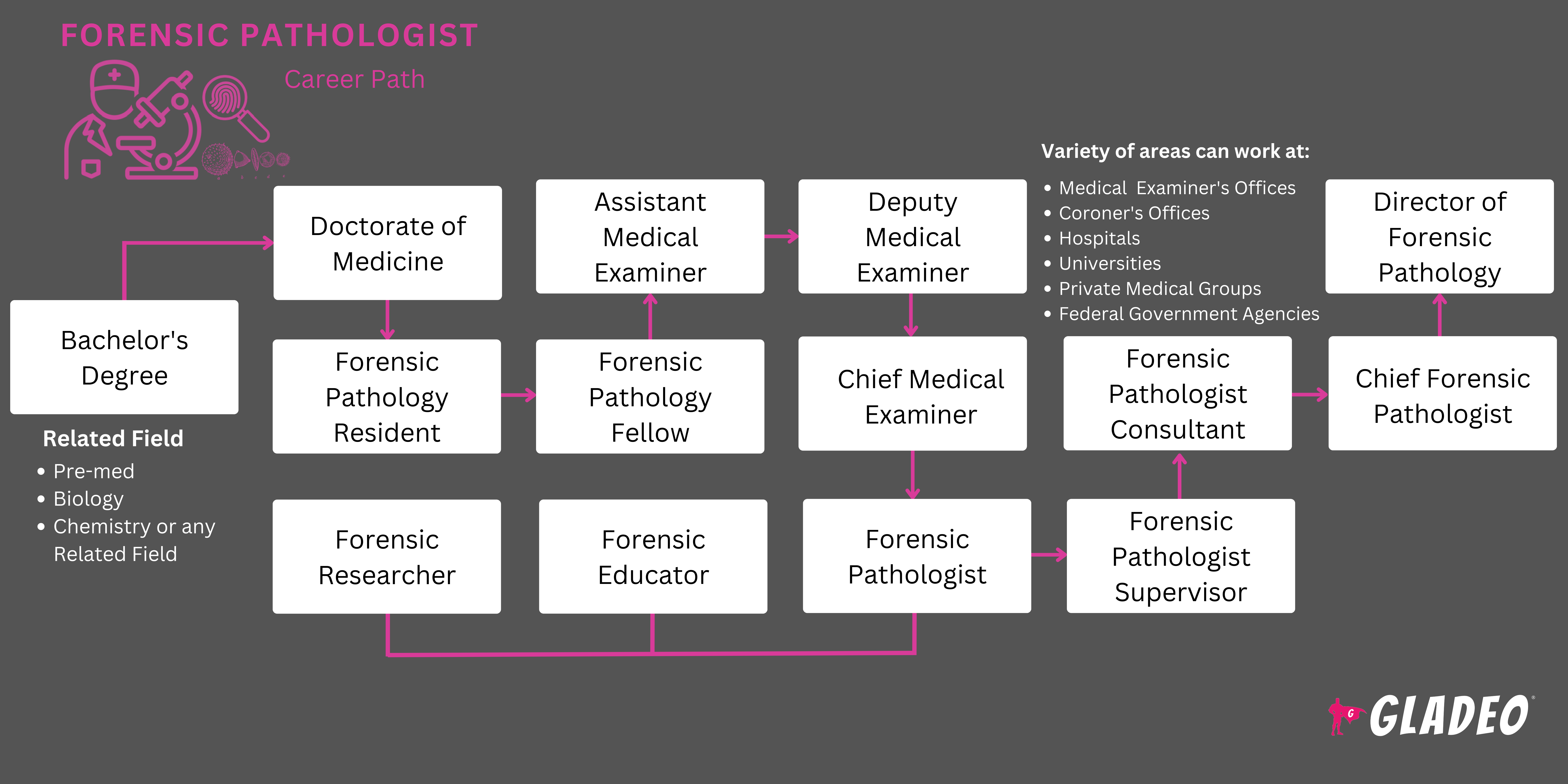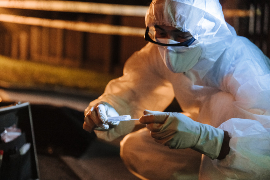聚光灯
解剖病理学家、细胞病理学家、皮肤病理学家、血液病理学家、神经病理学家、口腔病理学家、病理学家、外科病理学家、法医、验尸官、法医专家
法医学 是利用科学技术来调查犯罪和检查法律诉讼证据。病理学家 是通过检查组织、细胞和体液来诊断病人的医生。
将两者结合在一起,你就得到了法医病理学家--一名检查死者尸体以确定死亡方式和原因的医生。当死亡情况看似突然、可疑或无法解释时,通常会出于法律目的进行检查。
因此,法医病理学家在医疗和刑事司法系统中发挥着至关重要的作用,他们与执法部门密切合作,提供重要信息,从而破案并为家庭带来圆满结局。
- 与执法和法律团队合作,协助调查
- 运用知识破案和揭露真相
- 为刑事司法系统和公共卫生做出重大贡献
工作日程
- 法医病理学家通常全职工作,工作时间很长,包括晚上和周末,尤其是在处理备受瞩目的案件时。他们的工作要求精确和注重细节,而且往往时间紧迫。
典型职责
- 就涉及死者的案件与执法和法律团队合作
- 获取与死亡情况有关的详细信息(如发现尸体的地点、时间、尸体的位置、目击者证词、环境条件等)。
- 审查病史并进行尸检,以帮助确定死亡原因和死亡方式(方式类别包括自然死亡、他杀、自杀、意外死亡和未确定死亡)。
- 检查尸体有无异常或外伤痕迹。确定死后是否有疾病迹象
- 采集组织样本。在实验室分析样本,寻找疾病或中毒迹象
- 估计死亡时间
- 在详细报告中记录调查结果,包括观察结果和实验室结果
- 就调查结果和意见出庭作证
- 必要时为公共卫生组织或执法部门创建报告
- 培训和指导初级病理学家和医科学生
额外责任
- 参与公共卫生研究。通过分析死亡率趋势,帮助确定公共卫生问题
- 向法律和公共卫生机构通报可疑或重大发现
- 为死因不明的医疗病例提供咨询
- 参与持续教育和研究活动。了解法医学和病理学的最新进展
软技能
- 独立工作的能力
- 分析性的
- 批判性思维
- 好奇心
- 注重细节
- 情绪复原力
- 伦理
- 观察者
- 坚持不懈
- 身体耐力
- 解决问题
- 聪明才智
- 安全意识
- 健全的判断和决策
- 强大的沟通能力
技术技能
- 弹道分析
- 血迹模式分析
- 化学分析方法
- 数字成像技术
- 用于估计死亡时间的昆虫学
- 法医人类学
- 法医信息技术工具
- 法医牙科学
- 显微镜分析和组织病理学
- 分子生物学技术
- 个人防护设备
- 精神病理学
- 公开演讲
- 放射学和成像技术,如 CT 扫描和核磁共振成像
- 分析流行病学数据的统计方法
- 技术写作
- 政府卫生部门
- 医院
- 执法机构
- 法医或验尸官办公室
- 大学和研究机构
法医病理学家需要独特的医学专业知识和情绪适应能力。由于要与死者互动并参与法律案件,这份工作可能会给人带来情绪上的压力。
这一领域的工作人员必须能够保持高度的超然,因为他们要严格努力寻找线索,以揭示死亡的原因和方式。在某些情况下,他们可能不得不亲自前往犯罪现场。精确性、及时性和对细节的一丝不苟是最重要的,其结果往往会影响法律决定并影响他人的生活。
总之,这是一个复杂、高风险的职业,需要做出个人牺牲并致力于不断学习。然而,工作的结果可能是有回报的,例如帮助悲痛的家庭找到解脱,在某些情况下,协助将危险的罪犯定罪。
由于数字病理学和用于无创尸检的先进成像技术等技术的进步,法医病理学领域正在不断发展。分子尸检也日益受到重视,利用基因检测发现遗传性疾病和基因异常。这些功能提高了死因鉴定的准确性。
通过监测和分析死亡率趋势的举措,法医病理学家在公共卫生领域也发挥着举足轻重的作用。他们的研究结果可以为公共卫生政策提供依据,从而防止诸如吸毒过量和工业毒素等环境因素造成的死亡。
社交媒体甚至通过提供关键信息和线索来帮助法医调查。此外,在线平台还极大地促进了法医病理学界的网络联系和知识共享!
从事法医病理学工作的人通常对科学,尤其是生物学和化学有着浓厚的兴趣。他们可能对谜题和奥秘很感兴趣,渴望了解事物的运作原理,尤其是人体和健康方面的知识。
- 法医病理学家需要接受约 13 年的教育和培训,首先要获得学士学位,通常是生物学、化学或法医学等科学领域的学士学位。
- 需要注意的是,本科专业没有特别要求,但您必须为医学院研究生院打下坚实的基础(医学院研究生院可能很难进入)。此外,您可能还需要修读特定的先修课程,因此请向您计划申请的医学院课程咨询。
- 本科毕业后,学生必须进入认可的医学院完成医学博士(MD)或骨科医生(DO)课程。这通常需要四年才能完成
- 注意,学生必须在大三期间或之后参加医学院入学考试(MCAT),并在申请医学院时提交分数
- 医学院毕业后,他们通过美国医学执照考试(医学博士)或综合骨科医学执照考试(执业医师),开始取得医学执照。
- 接下来是为期约 4 年的病理学住院医师培训课程,以获得全面的病理学知识,包括解剖和临床病理学、疾病机制、诊断技术和实验室技能。
- 与所有住院医师培训一样,病理学住院医师培训竞争激烈,不能保证医学院毕业生一定能被住院医师培训项目录取。
- 没有通过国家住院医师配对计划配对到住院医师的学生还可以通过补充录取和接受计划进行尝试。
- 实习结束后,法医病理学家会进行 1 到 2 年的研究,专门研究与医学和死亡调查的法律方面有关的原则和实践。
- 这包括进行尸检和解释毒理学分析
- 未来的法医病理学家应寻求拥有强大病理学课程、临床轮转机会和一流研究设施的经认可的医学院校
- 研究教师的简历,了解他们目前的研究情况以及过去的获奖情况和工作情况
- 考虑学费、折扣和当地奖学金机会(除通过FAFSA 获得联邦援助外)
- 了解法医病理学家一天的生活!
- 重点学习生物、化学、解剖学、生理学、数学和物理课程。开设演讲或辩论课程也很有帮助
- 与高中顾问讨论提前分班课程,为上大学做好准备
- 努力提高各方面的成绩,这样在申请大学本科学位时,你的 GPA 才会有竞争力
- 决定您在本科阶段想主修的专业,同时牢记您要为日后进入医学院打下基础!认真选择选修课,以便在化学、生物、数学和其他先修课程方面打下坚实的医学预科基础
- 参加与科学、医学、病理学或法医学有关的学生俱乐部
- 协助开展研究项目,参加研讨会,获得实际操作经验
- 法医病理学家可能需要了解从毒理学和血清学到枪械、弹道学和痕迹证据等各种学科的知识。
- 保持你的 GPA,因为要进入医学院是很困难的。医学院的平均录取率为 40%。争取获得学术荣誉和奖项
- 努力学习医学院入学考试(MCAT)
- 寻找与医学或法医相关的兼职工作、志愿者机会或实习机会,尤其是在法医或验尸官办公室,如果可能的话
- 保留一份医学院申请表草稿,列出您的所有相关经历和技能
- 保持健康的体魄,以应对长时间的学习和工作要求!
- 考虑一下您希望将哪些人列为推荐人,哪些人可以为您的医学院申请撰写推荐信。您需要 3 到 5 封推荐信,最好是来自医学领域的教授。
- 准备就绪后,就可以申请医学院:

- 在医学院学习期间,在临床轮转(又称实习)中尽自己最大的努力,争取获得优等或高分,尤其是在病理学专业方面
- 你在轮转期间的表现将证明你作为住院医师的成功潜力!
- 从医学院毕业并通过相应的执业资格考试(医学博士的美国医学执业资格考试或骨科医学博士的综合执业资格考试)后,就可以尝试匹配住院医师培训计划了。
- 从技术上讲,你的第一份病理学家工作将是在病理住院医师培训项目中担任住院医师!住院医师是工作中的医生,在法律上被承认为医生,但要独立执业,他们必须完成住院医师培训。
- 需要注意的是,住院医师培训项目会向住院医师支付津贴,这也算是一种工资。但是,它低于完成全部教育和培训的医生的工资。
- 提前准备住院实习申请,包括可以证明你能力的教师或导师的推荐信
- 重点介绍你完成的相关临床轮转、选修课和课外活动
- 对住院实习项目进行研究,了解他们的文化、价值观和其他细节,以便有效地定制您的申请材料。
- 撰写一份引人注目的个人陈述,表达你对专业的热情、你的职业目标以及你成为独特候选人的原因!
- 努力在美国医学执照考试(USMLE)或骨科医学综合执照考试(COMLEX)中取得高分
- 通过了解计划工作人员或可能的面试官、计划本身以及与计划相关的主题,为面试做好准备
- 完成住院医师培训后,您将进入为期一到两年的高级培训项目--研究员培训项目。
- 研究金提供验尸和法医病理学服务方面的实践经验,以及死亡现场调查、验尸和法庭作证技能方面的学术指导
- 完成研究金课程后,法医病理学家将参加美国病理委员会的法医病理认证考试。
- 考试以计算机为基础,包括笔试/实践部分的 225 道题和虚拟显微镜部分的 50 道题。
- 学科领域包括
- "自然疾病、治疗和创伤的病理学和解释、
- "伤害模式和圣痕的解释、
- "自然死亡和暴力死亡的病理学和认证、
- "临床和尸检化学成分和毒物学的解释
毒理学、 - "分子生物学、法医牙科学、体质人类学和
- "犯罪学、公共卫生、法学、管理和安全"
- 在某些情况下,需要额外的州特定执照
- 一旦完成所有的实习、认证和执照,法医病理学家就可以真正开始提升自己的职业生涯,在备受瞩目的案件中积累经验
- 考虑在神经病理学、儿科病理学或法医人类学等领域专攻专业调查角色
- 慢慢晋升为高级法医病理学家/首席法医等领导职务
- 如果您对教学和研究感兴趣,可考虑在医学院和大学中担任教职、系主任或领导研究项目。
- 在法律案件中担任专家证人或顾问,或在政策制定中担任咨询角色
- 指导学生和住院医师。认真遵守所有安全协议
- 通过持续教育和专业发展保持认证
- 通过发表研究论文、会议发言和参加小组讨论来提升自己的形象。寻求在专业组织中担任领导职务
- 与国际组织合作开展全球卫生倡议、灾害应对和人权调查
网站
- 医学研究生教育认证委员会
- 美国法医学会
- 美国骨科医学院申请服务协会
- 美国犯罪学委员会
- 美国法医昆虫学委员会
- 美国法医毒理学委员会
- 美国法医死亡调查员委员会
- 美国病理学委员会
- 美国化学学会
- 美国医学院申请服务
- 美国病理学调查学会
- 美国犯罪实验室主任协会
- 枪支和工具标记检验员协会
- 法医 DNA 分析和管理者协会
- 秘密实验室调查员协会
- 美国病理学家学院
- 综合骨科医生执照考试
- 国际鉴定协会
- 国际血迹图案分析师协会
- 国际犯罪现场调查员协会
- 国际执法和紧急服务视频协会
- 医学院入学考试
- 美国显微镜学会
- 中大西洋法医科学家协会
- 中西部法医科学家协会
- 全国医学检验员协会
- 东北法医科学家协会
- 法医毒理学家协会
- 南方法医科学家协会
- 西南法医科学家协会
- 德克萨斯州医学院和牙医学院申请服务
- 美国医学执照考试
书籍
- 诊断病理学:法医尸检》,玛丽-安-森斯医学博士和罗姆-休斯医学博士著
- DiMaio 的《法医病理学》(刑事和法医调查的实用方面),Vincent J.M. DiMaio 和 D. Kimberley Molina 著
- 法医病理学原理:从调查到认证》,苏珊-F-伊利和詹姆斯-R-吉尔著
法医病理学家的工作非常重要,但要求也很高,工作一段时间后会对情绪和身体造成影响。如果您有兴趣了解其他职业领域,请查看以下选项!
- 生物学技术员
- 化学家和材料科学家
- 临床病理学家
- 验尸官
- 侦探和刑事调查员
- 数字取证分析师
- 欺诈审查员、调查员和分析员
- 组织学技术员
- 情报分析员
- 法医
- 医学和临床实验室技术员
- 医学研究员
- 警察和侦探
- 警察身份和记录干事
- 私家侦探和调查员
- 公共卫生管理员
- 毒理学家
新闻联播

特色工作

在线课程和工具








